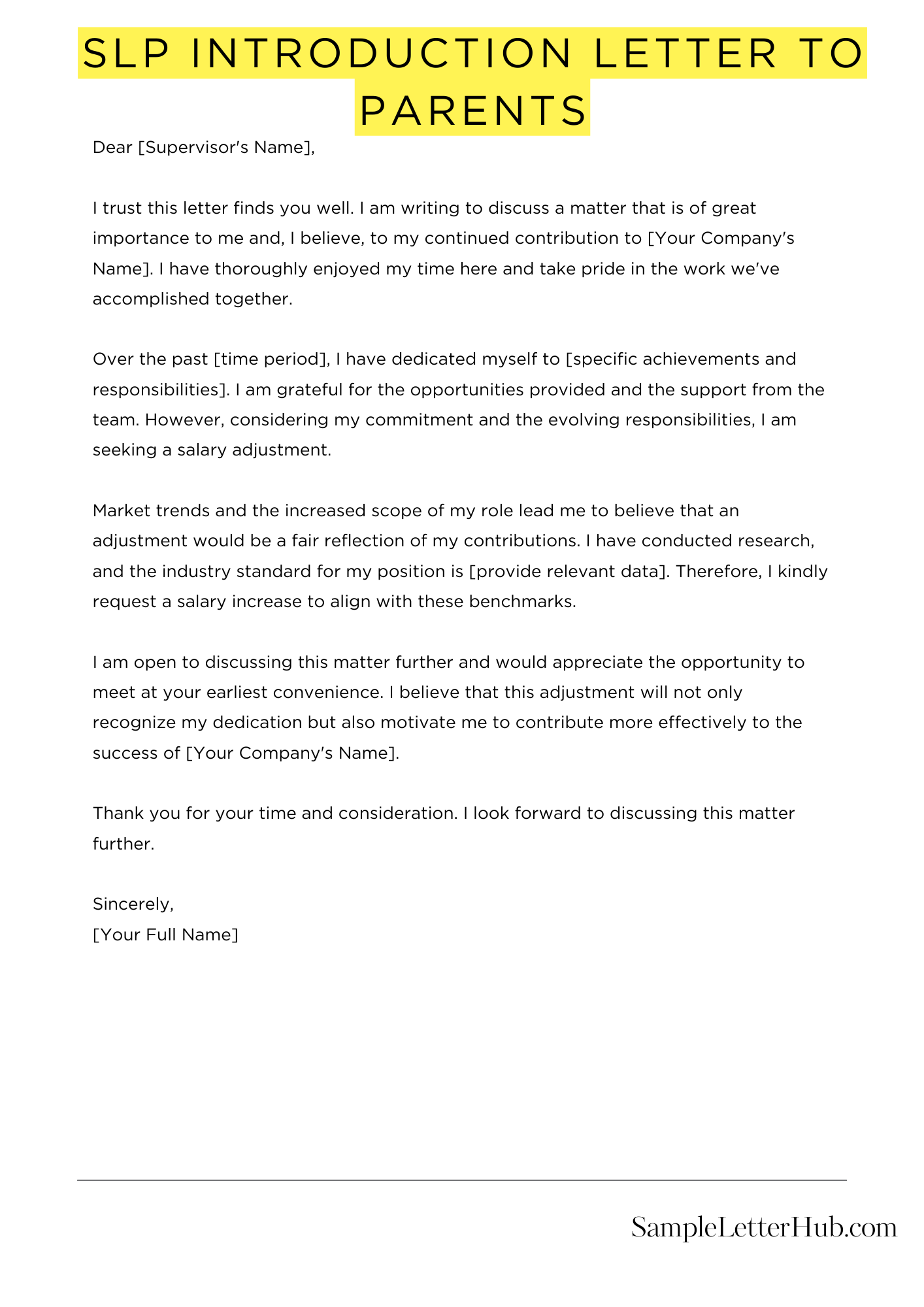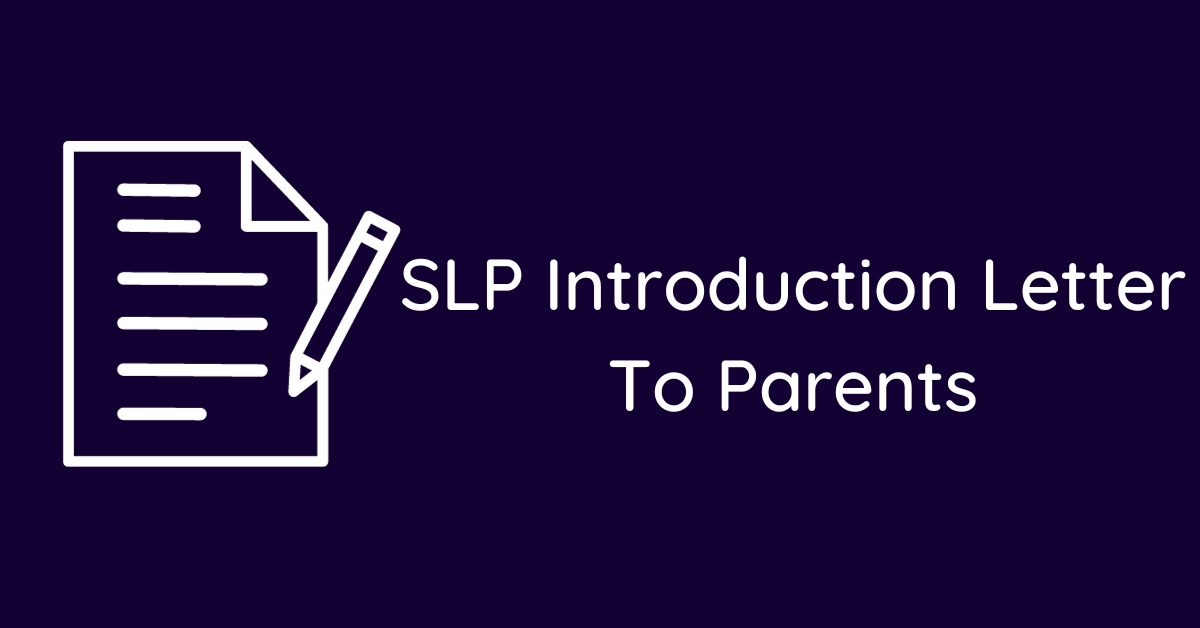Are you a speech-language pathologist (SLP) who needs to introduce yourself to parents? Or are you a parent who has received an SLP introduction letter and wants to know what to expect? Look no further! In this blog article, we will provide you with all the information you need to know about SLP introduction letters.
Our goal is to make it easy for you to write your own SLP introduction letter or to understand the one you have received.
We will share templates, examples, and samples of SLP introduction letters that you can use as a guide. Whether you are a seasoned SLP or a new graduate, we have got you covered.
By the end of this article, you will have a better understanding of what an SLP introduction letter is, why it is important, and how to write one that effectively communicates your expertise and services to parents. So, let’s get started!
SLP Introduction Letter To Parents
Dear Parents/Guardians,
We hope this letter finds you well. We are delighted to introduce you to our Speech-Language Pathology (SLP) program at [Your School’s Name]. Our mission is to provide comprehensive speech and language services to support your child’s communication and academic success.
Our dedicated team of licensed and certified speech-language pathologists is committed to identifying and addressing any speech or language challenges your child may be facing. Through individualized assessment and therapy sessions, we aim to enhance their communication skills, promote confidence, and foster a positive learning environment.
Whether your child requires assistance with articulation, language development, fluency, or social communication, our SLP program is tailored to meet their unique needs. We believe in collaboration and open communication, and we encourage you to actively participate in your child’s therapeutic journey.
If you have any questions or concerns, please feel free to contact our SLP department at [SLP Contact Information]. We look forward to working closely with you to ensure your child’s success in communication and beyond.
Thank you for entrusting us with the care and development of your child’s communication skills.
Sincerely,
[Your Name]
Letter Of Introduction To Parents
Dear Parents/Guardians,
We extend a warm welcome to you as a part of the [Your School’s Name] family. It is our pleasure to introduce ourselves and share some insights into our school’s mission, values, and educational approach.
At [Your School’s Name], we are dedicated to fostering a nurturing and stimulating learning environment for your child. Our committed team of educators, administrators, and support staff work collaboratively to ensure that each student receives a well-rounded education.
We believe in the importance of open communication between school and home. Regular updates about your child’s progress, upcoming events, and school activities will be shared with you. We encourage your active involvement in your child’s educational journey.
Should you have any questions, concerns, or if there’s anything specific you’d like to discuss, our doors are always open. Your partnership with us is crucial, and together, we can provide the best possible education for your child.
Thank you for entrusting us with your child’s education. We look forward to a positive and enriching school year ahead.
Warm regards,
[Principal’s Full Name]
Free SLP Introduction Letter To Parents
Dear Parents/Guardians,
We are delighted to welcome you and your child to [Your SLP Practice Name]. As Speech-Language Pathologists, our goal is to enhance communication skills and foster a positive and supportive environment for your child’s speech and language development.
At [Your SLP Practice Name], we understand the importance of effective communication in a child’s overall development. Our team of experienced and dedicated Speech-Language Pathologists is committed to providing personalized therapy that addresses your child’s unique needs.
We believe in a collaborative approach, and we encourage open communication with parents throughout the therapy process. Regular updates on your child’s progress and recommended activities for home practice will be shared to ensure continuity and success.
If you have any questions or concerns, please feel free to reach out. We are here to support you and your child on their journey to improved communication skills.
Thank you for choosing [Your SLP Practice Name]. We look forward to working together to help your child thrive in their speech and language development.
Best regards,
[Your Full Name]
SLP Introduction Letter To Teachers
Dear [Teacher’s Last Name],
I hope this letter finds you well. My name is [Your Full Name], and I am a Speech-Language Pathologist from [Your SLP Practice Name]. I wanted to take a moment to introduce myself and inform you about the services we offer to support the communication needs of students at [School Name].
At [Your SLP Practice Name], we specialize in providing comprehensive speech and language therapy for children of all ages. Our goal is to enhance communication skills and contribute to the overall academic success of students.
We understand the importance of collaboration between educators and speech-language professionals. By working together, we can create a supportive environment that maximizes the potential for each student’s success. I am here to assist you and your colleagues in identifying and addressing any speech or language concerns that may impact a student’s educational experience.
If you have any questions or if there are specific students you believe could benefit from our services, please don’t hesitate to reach out. I am more than happy to discuss potential collaborations and how we can work together to meet the unique needs of each student.
Thank you for your time, and I look forward to the opportunity to support the students at [School Name].
Best regards,
[Your Full Name]
School SLP Introduction Letter To Parents
Dear Parents,
We hope this letter finds you well. We are excited to introduce the Speech-Language Pathology (SLP) services at [School Name]. Our dedicated team of SLP professionals is committed to supporting your child’s communication and language development throughout their academic journey.
Speech and language skills are integral to a child’s success in both social and academic settings. Our SLP team is here to provide assessments, interventions, and consultations to ensure that every student at [School Name] has the opportunity to thrive.
If you have any concerns about your child’s speech or language development, or if you believe they may benefit from our services, please don’t hesitate to contact us. We welcome open communication and collaboration to create the best possible learning environment for your child.
Our goal is to work together with parents, teachers, and other professionals to enhance each child’s communication abilities. We look forward to fostering a supportive partnership with you and making a positive impact on your child’s educational experience.
Thank you for entrusting us with the privilege of contributing to your child’s growth and success at [School Name].
Best regards,
The School SLP Team

How to Write an Effective SLP Introduction Letter to Parents
As a speech-language pathologist (SLP), one of the most important tasks you have is to communicate with parents about their child’s progress.
Writing an SLP introduction letter to parents is a crucial step in establishing a positive relationship with them. In this article, we will discuss the key elements of an effective SLP introduction letter to parents.
1. Introduction
The introduction of your letter should be warm and welcoming. Start by introducing yourself and your role as an SLP. You can also mention your experience and qualifications to establish credibility. Make sure to express your enthusiasm for working with their child.
2. Purpose of the Letter
In the next section, clearly state the purpose of your letter. Explain that you are writing to introduce yourself and to provide information about your services. You can also mention that you will be working closely with their child to help them improve their communication skills.
3. Assessment and Evaluation
Parents want to know what to expect from your services. In this section, explain the assessment and evaluation process. Let them know that you will be conducting a thorough evaluation of their child’s communication skills to identify areas of strength and weakness. You can also mention the tools and techniques you will be using to assess their child.
4. Treatment Plan
After the assessment, you will develop a treatment plan for their child. In this section, explain the goals of the treatment plan and the strategies you will use to achieve them. Make sure to emphasize that the treatment plan will be tailored to their child’s specific needs and that you will work closely with them to ensure their child’s progress.
5. Communication
Communication is key to a successful relationship with parents. In this section, explain how you will communicate with them about their child’s progress. Let them know that you will provide regular updates on their child’s progress and that you are available to answer any questions they may have.
6. Parent Involvement
Parents play a crucial role in their child’s progress. In this section, encourage parents to be involved in their child’s treatment plan. Let them know that you value their input and that their involvement is essential to their child’s success.
7. Conclusion
In the conclusion of your letter, summarize the key points you have made. Thank the parents for their time and express your excitement about working with their child. Provide your contact information and encourage them to reach out to you with any questions or concerns.
FAQs About SLP Introduction Letter to Parents
1. What is an SLP introduction letter?
An SLP introduction letter is a letter that is sent to parents by a speech-language pathologist (SLP) to introduce themselves and their services to the parents of a child who may need speech therapy.
2. Why is an SLP introduction letter important?
An SLP introduction letter is important because it helps to establish a relationship between the SLP and the parents. It also provides parents with important information about the SLP’s qualifications, experience, and services.
3. What should be included in an SLP introduction letter?
An SLP introduction letter should include the SLP’s name, qualifications, experience, and services. It should also include information about the child’s speech and language development, as well as any concerns that the parents may have.
4. How should an SLP introduction letter be written?
An SLP introduction letter should be written in a clear and concise manner. It should be easy to read and understand, and should avoid using technical jargon. It should also be personalized to the child and their specific needs.
5. When should an SLP introduction letter be sent?
An SLP introduction letter should be sent as soon as possible after the child has been referred for speech therapy. This helps to establish a relationship between the SLP and the parents early on in the process.
6. What should parents do after receiving an SLP introduction letter?
After receiving an SLP introduction letter, parents should read it carefully and ask any questions they may have. They should also schedule an appointment with the SLP to discuss their child’s speech and language development.
7. What are the benefits of receiving an SLP introduction letter?
The benefits of receiving an SLP introduction letter include establishing a relationship with the SLP, gaining a better understanding of the SLP’s qualifications and experience, and having a clear understanding of the services that the SLP provides. This can help parents to make informed decisions about their child’s speech therapy.
Related:
- Property Management Letter To Owners ( 5 Samples )
- Change Of Ownership Letter To Vendors ( 5 Samples)
- Letter To Extend Maternity Leave ( 5 Samples)
- Authorization Letter For Minor To Travel Without Parents (5 Samples)
- Complaint Letter To Car Dealership ( 5 Samples)

